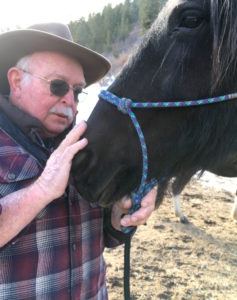
Phil Ratliff
The horse’s mouth has in it about 40 teeth (mares often have fewer). There are incisors, premolars, molars, and sometimes canine and wolf teeth. It’s a mysterious place for most horse owners. Vets suggest protocol for floating (the process of rasping teeth with hand and power tools) and often perform floats. Equine dentists work on horses, too, and are sometimes praised for being more qualified since that’s all they do.
Their authority and ability to work, however, is dictated by state laws, which may or may not require them to work with or under a vet.
Equine dentist Phil Ratliff, owner of Rite Bite Equine Dentistry, occupies rare territory in this miasma of professionals working on horses’ teeth: he’s an equine dentist conducting research with a university professor. Neither an academic, nor a vet, Ratliff is nonetheless uncovering some impressive findings that tie the teeth to the gut and to the feet.
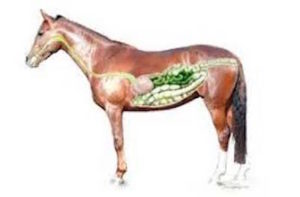
When horses can’t chew properly, the guts’ ecosystem in negatively impacted
For the past several years, Ratliff, with the counsel and collaboration of Dr. Robert Bowker (a 2017 Best Horse Practices Summit presenter and director of the Equine Foot Laboratory at Michigan State University), has focused on the connection between metabolic concerns (like Cushings Disease, laminitis, and insulin resistance (the horse’s version of diabetes)) and teeth anatomy.
What they are uncovering is a fascinating, multi-dimensional connection that at once makes perfect sense and yet seems confounding:
Those ‘fat’ horses? They are actually starving, regardless of their diet. And, if you correct their teeth, while keeping all other factors (including exercise and diet) the same, those horses’ health will improve.
“It sounds totally wrong,” said Ratliff with a smile during a recent interview.
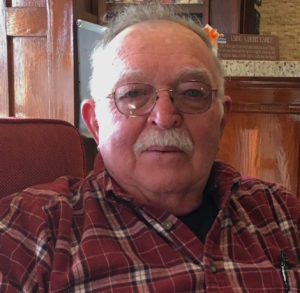 Ratliff, a graduate of the Academy of Equine Dentistry in Idaho, has studied scores of horses with insulin resistance. Generally speaking, their teeth needed correction; because of their teeth, they were not able to chew their hay well. Their manure was full of fibers measuring eight millimeters or longer on average. Healthy chewers yield manure with fibers measuring two millimeters or shorter.
Ratliff, a graduate of the Academy of Equine Dentistry in Idaho, has studied scores of horses with insulin resistance. Generally speaking, their teeth needed correction; because of their teeth, they were not able to chew their hay well. Their manure was full of fibers measuring eight millimeters or longer on average. Healthy chewers yield manure with fibers measuring two millimeters or shorter.
Why does poop fiber length matter?
Hay heads to the gut where a host of microorganisms facilitate its digestion. It’s a bacterial world with heroes and villians. In horses with healthy teeth, specific ‘good’ bacteria help convert those tiny fibers into energy and nutrients.
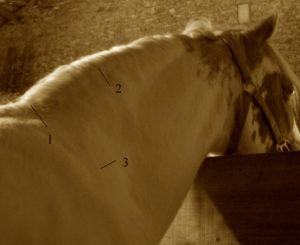
A cresty neck is an easy indicator for an overweight horse. That horse may develop metabolic concerns.
In horses with poor teeth, the gut’s microorganism populations are negatively altered. Optimal nutrient conversion is not possible. Instead, these microorganisms, ‘bad bacteria’ as Ratliff calls them, convert the fibers to sugar. That alteration in nutrient processing is what leads these horses to have insulin resistance problems. As we know, insulin resistance concerns often include or lead to hoof problems like laminitis and founder.
In his work, improving the efficiency of mastication (chewing) has vastly improved the health of these overweight, nutritionally starved horses.
Another finding in Ratliff’s decades of observation:
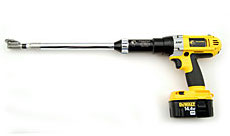
Ratliff raises a big red flag when it comes to power tools in horses’ mouths.
In the wrong hands, power floating can be extremely detrimental to the horse. Ratliff suggests that the thermal friction inherent in the use of power float tools damages the teeth and can eventually lead to tooth death. Bowker cautions, though, that power tools can be effective if used properly and that we should focus more on the operator and less on the tool.
Check out Steve Akeley, a like-minded equine dentist in Maine.
good points…no pun intended. There are also a variety of schools of thought on dentistry around these parts. I call one the Dewalt school of dentistry and won’t let anyone there work on my horses teeth. I know how easily I can strip a screw head with a power drill so I’ve thought the same with teeth. Also don’t see how you can feel level with one tool. Doing teeth well is also about feel. There are a couple of equine dentists and a few vets who are also pretty handy and combine the traditional floating with a dremel & attachment to get points, hooks and ramps that would take a while by hand. The more perspectives the better – hadn’t thought of the connection to the overweight horses. I know a couple that will be getting their teeth done soon!
I have my horses looked at regularly by my equine dentist, Maine’s Steve Akeley. I know how important it is for the equine’s growing teeth to be leveled and rough edges/points be taken off. I also have a senior mare who lost an upper molar and so we continue to watch the opposing one so that it doesn’t grow into the opposite vacant spot. But I certainly never thought about lack of good chewing action leading to a horse becoming obese. In fact, we usually look to the teeth for an answer when we see an underweight horse that has trouble putting on necessary pounds. But, I have never actually had an obese horse that I needed to slim down before. Great article! I always knew healthy, comfortable teeth was necessary for the overall health of my horses. Now I have another perspective!
I have had a good experience with a vet floating teeth manually & a very bad experience with a former teacher @ the ID dental school using power tools so the horse was able to chew after the float. It is like all practitioners, the same information can be handled very differently from person to person.
I need to change my post to the horse was UNABLE to chew after the float.
My concern has always been that it’s illegal for anyone other than a doctor to administer sedative injections. If a person who only performs dentistry induces sedation and the horse goes into anaphylactic shock, can the dentist take care of the situation? I have heard of tragic outcomes in such situations.